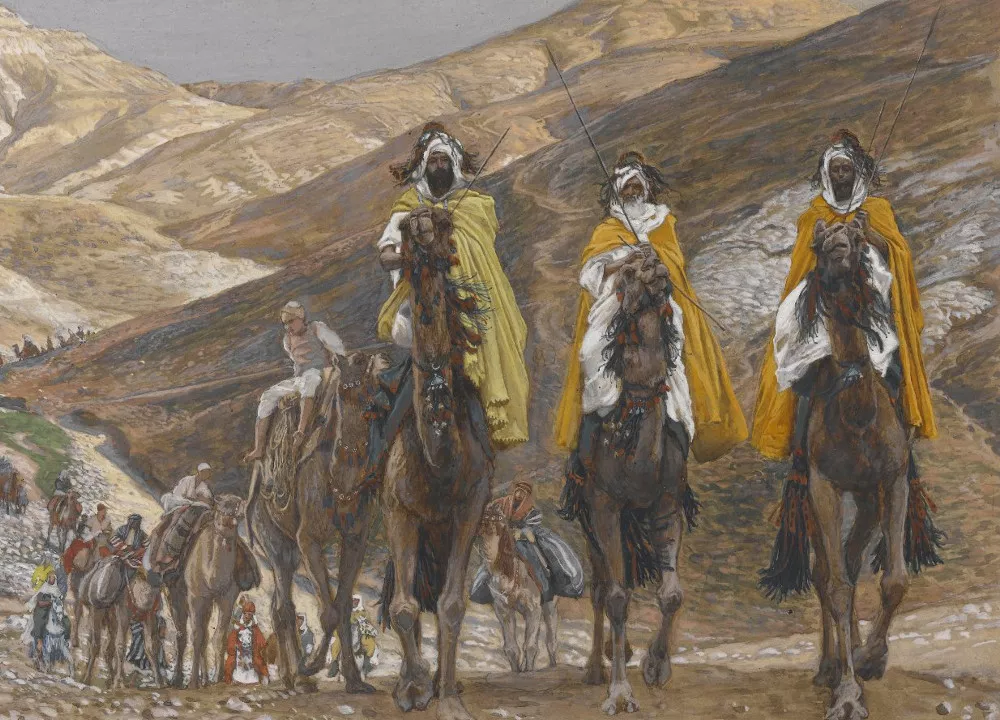Spiritual Sunday – First Sunday in Epiphany
I repost today an Epiphany poem by my father, one of my favorites, along with my previous notes on it. Epiphany is when Christians celebrate the entry into the world of the radical new idea that love is more powerful than death. To call the idea counterintuitive is a spectacular understatement. Fear can rule our lives, which is why we need constant prayer and worship to rekindle our faith. The notion that love can trump death didn’t originate with Jesus, but he embodied it so powerfully that it caught on.
Melchior, Caspar and Balthasar, the three wise men, stand in for the greater world. They also represent mystical wisdom. Perhaps we could say that the shepherds who came to see the infant Jesus have the simple faith of the heart whereas the magi have the higher wisdom of the head. (This is how Auden sees it in a poem I have posted on in the past.) Neither is complete without the other.
In the past I have written about T. S. Eliot’s “Journey of the Magi,” where one of the kings recalls the moment, years ago, when he saw the Christ child. He remembers that the journey to Bethlehem was hard but worth the suffering. Since that time the vision has clouded over, and he is “no longer at ease here, in the old dispensation,/With an alien people clutching their gods.”
Today’s poem, considerably lighter, takes the vantage point of one of the camels. Rather than lamenting the loss of belief (a nonstop Eliot theme that eventually becomes tiresome), the poem tells us to be good community citizens. Regardless of where we live and what we do, we can live in love and service. That, the camel tells us, is how Christ’s love manifests itself in the world.
There is an implied criticism in the poem of the kings for not having stuck it out with the Christ child–that’s why the camel has to slip away–so perhaps the poem does echo Eliot’s. We once were in touch with divinity before returning to our normal lives.
Then again, as I said, we all of us lose the vision and must rediscover it. Again and again.
You’ll probably recognize the Biblical allusion in the final stanza but, in case you don’t, it’s Jesus’ assertion (Matthew 19:24) that “it is easier for a camel to pass through the eye of a needle than for a rich man to enter the kingdom of Heaven.” “Effendi” is Arabic for “Master.”
Here’s the poem:
Fable of the Third Christmas Camel
By Scott Bates(Editor’s note: The following poetic fragment, evidently an overlooked scrap of the Dead Sea Scrolls, was recently discovered near Jerusalem, stuck to the bottom of an empty bagel can. We offer here an approximate translation into modern English of this invaluable historical document.)
I went all the way
But on the return trip
I gave the caravan
The slipOne desert night
Quit Balthazar
With all his frankincense
And myrrhAnd headed out
Across the sand
It was dawn when I came
To this strange landAnd found this family
Living here
Without a camel
Because they were poorSo I stayed with them
Carried their hides
Gave all the kids
Free camel ridesSat with the baby
Worked with the man
Sang them ballads
Of IspahanCarried the water
Pulled the plow
Loved my neighbor
Who was a cowI like it here
I’m staying with them
As I wanted to stay
In BethlehemWith that other
Family I knew
Which proves Effendi
That passing throughThe eye of a needle
Is an easier thing
For a camel
Than a king


